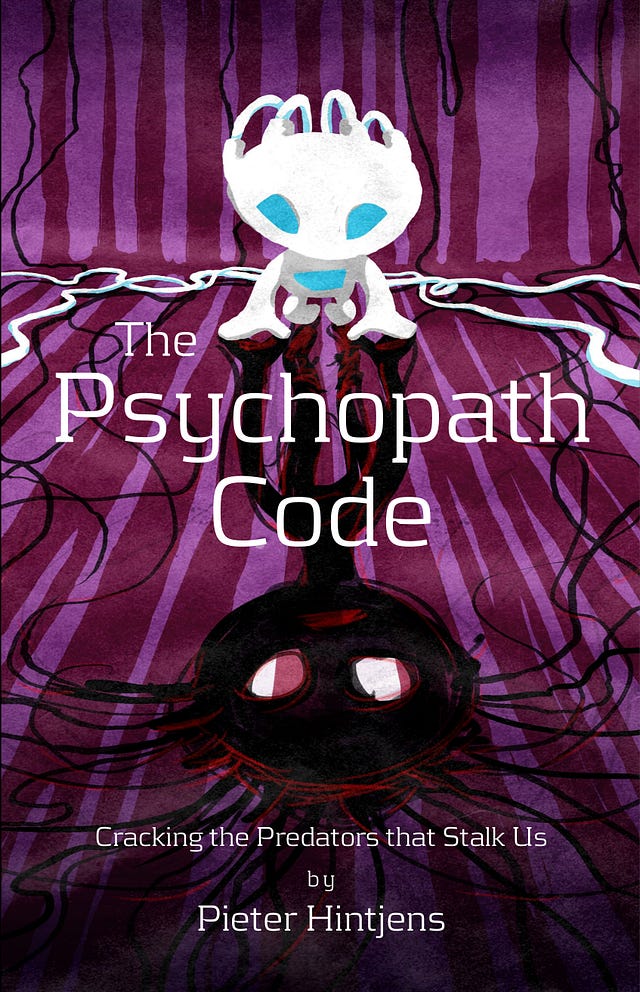Resources on Bad Actors in Human Social Constructions
Resources on bad actors in human social constructions

The Psychopath Code by Pieter Hintjens
Why?
As a Free & Open Source developer and a citizen who really cares for our common goods (digital and physical), I’m quite often exposed to the question: how do we manage bad (read: exploitative, parasitic, sociopathic) actors who threaten our social construction, be it our pet FLOSS project gaining some traction or the next big revolutionary politic movement for a better world.
So, this text is essentially a somehow structured bookmark list of articles and other resources on parasitic behavior in social construction. It is rather tainted by FLOSS/geek culture because of my personal experience, but I would welcome any other feedback and contributions (contact me through the social links or directly PR’s that article).
There’s a whole literature about how human communities evolve and need to prevent themselves from abusive actors (who will naturally search political power).
This topic is related to a lot of other ones. I personally find helpful to connect it to brain bias, which are largely exploited by bad actors to inflect a community outputs towards their own benefits; decision/voting model, also largely exploited to puppetize the system (polarizing “us” vs “them”, even in inner groups); and “meritocratic” thinking, which is mostly flawed at social community level (but is quite appealing for a young person who thing he mostly succeeded by himself). This subjects may lead to other bookmark-post if there’s interest!
Bad actors: patterns
There’s no one-fits-all definition for bad actors / sociopath, but some personality traits are consistent: pathologic liars to the point that reality has no ascendancy on them ; extremely egocentric and egoist ; extract values from systems whatever the consequences for anything or anybody but short-term themselves ; and actually, that last point is really hard to get for a social human: they act with other people as if they were just tools (not even pets, just tools). Once the screwdriver is not useful anymore, they discard it with even less emotion than you would for an useful, now broken tool. And they have absolutely zero sens of measure, so yes a short term profit for them against death of Humanity is a valid exchange.
Pieter Hintjens
I can’t advise enough to read almost anything written by Pieter Hintjens, because his experience with FLOSS community was huge, gives lots of real examples, and of course it’s easy to transpose it to other FLOSS community cases.
The psychopath code
I have a sweet heart for “The psychopath code” (freely readable here). This book should be a must read for any empathic human in need to know how the world works, that there’s bad actors lying there - and that just knowing they are here and how they hunt for you is a big part of the defense against them.
When I first read it, it was a real illumination and it brought to me a very clear and precise framework that I was missing to explain a full category of social interaction I had in my life. I wasn’t able to understand these interactions because they didn’t made any sense based on a “social human relationship” hypothesis. “The psychopath code” helped me understand that that hypothesis was wrong: some human are not of the social species. And also that I have been quite lucky until know ;)
Also, “the psychopath code” is almost a “Trump: how to” book, so it’s quite funny to see how good a predictive framework it is based on that very well studied and documented example.
“Social Architecture” and other resources
There is a lot of other resources from Hintjens about how you can build an efficient community, even if they are less targeted towards dealing with the problem of bad actors. For example, “Social Architecture” helps understand how Hintjens built a sane community around ZeroMQ with the C4.1 process (see also http://hintjens.com/blog:93).
All these texts also point to other resources, so you may see this site as a journey for wandering through human construction and geek culture.
Geeks, MOPs, and sociopaths in subculture evolution
This article is a good, short introduction to the dynamic happening on fringe cultures and how sociopath comes to extract values from such communities, spoiling them to the point where nothing remains to be saved.

Geeks, MOPs, and sociopaths in subculture evolution
Too late for the Pebbles to Vote
I also like other more broad reference: “Too Late for the Pebbles to Vote, Part 1” (and following).
This series of articles is more a journey based on the real example of what happen to the narrator in the context of the Tor project. Don’t seek general truth there, but the feedback and analysis put on that traumatic experience are an eye opener, especially about how efficient bad actors may be to make you doubt of yourself and isolate you to potential allies.
There’s a pattern most observers of human interaction have noticed, common enough to have earned its own aphorism: “nice guys finish last.” Or, refactored, “bad actors are unusually good at winning.” The phenomenon shows up in business, in politics, in war, in activism, in religion, in parenting, in nearly every collaborative form of human undertaking. If some cooperative effort generates a valuable resource, tangible or intangible, some people will try to subvert the effort in order to divert more of that resource to themselves. Money, admiration, votes, information, regulatory capacity, credibility, influence, authority: all of these and more are vulnerable to capture.

Too Late for the Pebbles to Vote, Part 1
Part 2 explores the scaling problem of social communities:

Too Late for the Pebbles to Vote, Part 2
And part 3 tries to find way to avoid these pitfall:

Too Late for the Pebbles to Vote, Part 3
It’s an intense set of articles that covers most of the topic. It as a lot of cross-check with Pieter Hintjens writing, which is both reassuring and depressing.
Autocracy: Rules for Survival
“Autocracy: rules for survival” is more centered on the events of a bad actor coming to a position of legal power. It’s a feedback from real live experience about what to do in such a case, and of course deals with Trump election. As I said, Trump is almost a caricature of bad actor as defined in the “Psychopath code”, and that property was remarked by loads of people.

Autocracy: Rules for Survival
The article explain 5 survival rules in such a case. They also work with any bad actor.
Rule #1: Believe the autocrat. Rule #2: *Do not be taken in by small signs of normality. Rule #3: Institutions will not save you. Rule #4: Be outraged. Rule #5: Don’t make compromises.
Why Do So Many Incompetent Men Become Leaders?
A short article about the pervasiveness of sociopath impact on human communities:

Why Do So Many Incompetent Men Become Leaders?
Noticing You’re Confused
A very positive article about how you can avoid some sociopaths. Some people are better than other for that naturally, but anybody can be their prey. In these case, practical rationality can help. This short article is a return on experience on an avoided catastrophe along with resources to learn to practice your self-awareness.

Noticing You're Confused
No more rock stars: how to stop abuse in tech communities
This text from 2016 follows the violence and sexual assault affairs revelation around the then famous Jacob Applebaum security “rock star”.
It is important to see how Applebaum behavior follows the Psychopath Code script and the number of “impact craters” were discovered once facts started to get out. But more importantly, the text presents a set of simple rules (hard to implement and sustain), that can be linked to Elinor Ostrom rules on sustainable communities - but target on people safety in communities:
- Have explicit rules for conduct and enforce them for everyone
- Start with the assumption that harassment reports are true and investigate them thoroughly
- Make it easy for victims to find and coordinate with each other
- Watch for smaller signs of boundary pushing and react strongly
- Call people out for monopolizing attention and credit
- Insist on building a “deep bench” of talent at every level of your organization
- Flatten the organizational hierarchy as much as possible
- Build in checks for “failing up”
- Enforce strict policies around sexual or romantic relationships within power structures
- Avoid organizations becoming too central to people’s lives
- Distribute the “keys to the kingdom”
- Don’t create environments that make boundary violations more likely
How to get promoted
This text by Slava Akhmechet explain in a quick format how opportunists (a gentle way to say “parasits”) mask and dance around control tool in fast growing companies to just extract wealth and status, the two only things that matters for them.
https://spakhm.substack.com/p/how-to-get-promoted
I’m quoting the conclusion here, because it’s a nice wrapped up of what bad actors do:
In summary, an opportunist’s career advice is: ignore OKRs, switch projects well before the consequences of your decisions can be measured, act happy and easy-going, package bad news as appeals for slow systemic adjustments, don’t make anyone look bad, perform rituals with enthusiasm, grow headcount faster than baseline, let work invent itself, follow management fashions, avoid acute failures, believe this sincerely
Bad People: : Irredeemable Individuals & Structural Incentives
This text by William Gillis is rooted in anarchism philosophy. It explains the facts that some people, and not a few, like to live in command and control pyramidal structures. That not everyone is altruistic. That there is bad people,
"those for whom other people are not an extension of their own existence as sites of agency, but objects to be crushed or used."
So realization #1, again and again proved in history, old and current:
"A core anarchist realization is that we cannot guard against bad people by creating institutions of power because the same bad people will inevitably seize and wield those institutions. "
I won’t quote it all, but then it goes to police and “simplistic order” structures, how they attract bad people and defend pyramidal hierarchies - often with bad people on top. It describes the fact that these bad people see decentralisation of communications and large scale coordination and altruistic weapons like boycots (where you accept to lose personnaly for a better future for the community) as existential risks to them.
It also explains how the bad people are themselves very bad at organic coordination (too much selfishness) and rely on pyramidal power structures to compensate. And thus, they always drift towards the state and its institutions.
And that’s half the article. It is really very good.
